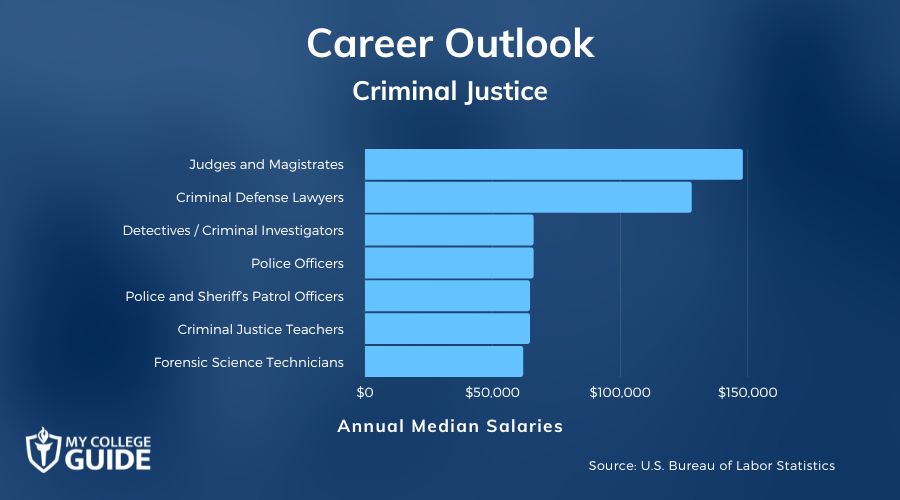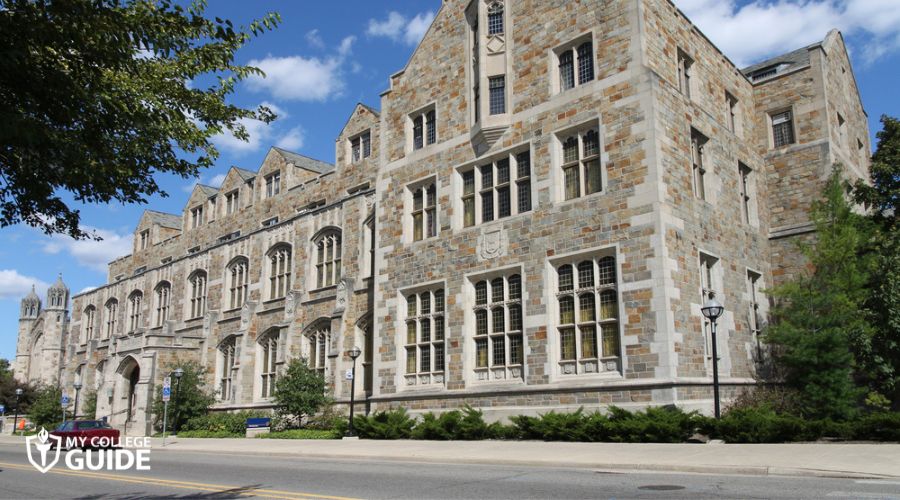With the flexibility of online classes and exciting courses that can be tailored to suit your interests, it is no wonder that online criminal justice degrees continue to be one of the most popular majors for students.

The criminal justice field is far-reaching, and graduates may be able to find career opportunities ranging from homeland security to forensics.
Editorial Listing ShortCode:
Do you believe in justice and have a desire to help bring peace and security to your community? Then working toward one of many available online criminal justice degrees is the perfect place to start.
Bachelors in Criminal Justice Degrees Online

Earning an online bachelor’s degree in criminal justice will give you the opportunity to pursue more specialized jobs within the field.
Editorial Listing ShortCode:
There are several career paths that you can take once you complete this educational level or you can move on to graduate programs to learn high-level skills within a concentration of your choice. Many universities offer criminal justice bachelor’s degrees that focus on a specific specialization. Some of the common options that you may find include:
- Crime scene investigation
- Homeland security
- Corrections
- Juvenile justice
- Law enforcement
Whether you are interested in applying for entry-level employment after graduation or plan on taking specific courses to qualify for a job with the FBI or CIA, a bachelor’s degree is a necessary step to achieve your goals.
Common Online Bachelor of Criminal Justice Concentrations

You may have a chance to select a specialization as part of your online criminal justice bachelors program. Here are a few common ones:
- Corrections: You’ll learn methods and practices for helping prisoners re-enter into society in a productive way.
- Victims and Victim Services: This concentration focuses on improving the lives of victims through learning about violence, trauma, and politics as these subjects relate to criminology.
- Cybercrime: You’ll learn about how to fight against crime through technology, including subsects of crime like cyberbullying.
- Police Administration and Operations: This concentration teaches students to help families and children through services like child protection programs and family courts.
- Law Enforcement: You’ll learn about all aspects of law enforcement, including homeland security and the psychology of law.
In addition to concentrations like these, you may be able to specialize in counterterrorism, human services, crime analysis, substance abuse, and more.
Criminal Justice Careers and Salaries

Whether you have dreams of working in law enforcement or in the legal realm, there are several career paths available for those who have chosen to earn bachelor degrees in criminal justice online.
To help give you an idea of the occupations associated with the various subfields of this degree program, we have put together a list of popular careers and their mid-career salaries based on data from the U.S. Bureau of Labor Statistics:
| Careers | Annual Median Salaries |
| Judges, Magistrate Judges, and Magistrates | $148,030 |
| Criminal Defense Lawyers | $127,990 |
| Detectives / Criminal Investigators | $66,020 |
| Police Officers | $66,020 |
| Police and Sheriff’s Patrol Officers | $64,610 |
| Criminal Justice and Law Enforcement Teachers | $64,600 |
| Forensic Science Technicians | $61,930 |
| Social Workers | $61,190 |
| Fraud Investigators | $59,380 |
| Security Guards | $31,470 |
The fastest growing professions in the world of criminal justice center on science and developing technologies. For example, the Bureau of Labor Statistics predicts a 6% growth in career opportunities for private detectives and investigators over the next 10 years.
To earn top salaries within the criminal justice field, it pays to put in the time to earn advanced degrees in your specialization. There is a wide variation in the salaries for occupations in criminal justice based on your expertise.
Editorial Listing ShortCode:
View our list of the top 40 Criminal Justice careers to compare jobs and salaries in this field.
Online BS in Criminal Justice Curriculum & Courses

The courses you take as part of online degrees in criminal justice programs may vary, but here are a few you may come across.
- Cultural Awareness in Criminal Justice: This class teaches students how different cultures and biases can have an impact on the criminal justice system.
- Statistics for Criminal Justice: You’ll learn the foundations of statistics as it relates to criminal justice, including analyzing data and testing hypotheses.
- Policing in the United States: This course covers the current relationships between the police, the community, the government, and those in the criminal justice system.
- Crime Theory and Causes: You’ll learn about why crime happens from different sociological, economic, and biological viewpoints.
- Technology in Criminal Justice: This class looks at how professionals in the industry can use different types of technology for optimal efficiency.
- Justice: An Overview: You’ll learn the foundations of criminal justice, including theories and practices related to justice, the police, and more.
- The United States Judicial System: This course examines different facets of the judicial system in the U.S., including the relationships and processes involved.
- Criminology and Social Control: You’ll learn about different methods for preventing and addressing crime, and get the chance to participate in case studies.
- Juvenile Delinquency and Justice: This class looks at why juveniles commit crimes, and how this has been dealt with historically as well as in the modern day.
- Introduction to Victimology: You’ll learn about the different types of victims, as well as how to help them through legislation.
In addition to classes like these, you may get the chance to participate in internships, case studies, and more.
How to Choose an Online Bachelor’s Degree in Criminal Justice Program

Criminal justice is a diverse field, and it is important that you are enrolled at a college that has a positive image and reputation within the industry. Below are several key factors to help you avoid getting caught up in a “degree mill” program when earning your online degree.
Below we will discuss some key areas to consider when choosing an online criminal justice bachelor degree program.
- Accreditation: Accreditation is an essential aspect of a reputable online accounting degree program. Check to see if your chosen school is accredited.
- Student-to-Faculty Ratio: When researching your prospective universities, take a look at the class sizes for your criminal justice courses. If the student-to-faculty ratio is too high, chances are that the professor will not be able to provide a high level of individual student support, making your online degree program a more difficult undertaking.
- Academic Advising and Student Services: Online student support goes far beyond a comprehensive curriculum and small class sizes. Top online universities also offer a variety of advising and student services to their non-traditional students that give them the additional support that they need to succeed in the field of criminal justice.
- Cost: The cost of each program is also an important factor as you may be on a strict budget. Compare various programs to see which one fits your budget.
- Degrees Offered: Be sure to check with each school you are considering to ensure they offer your chosen degree program. Also, compare the various programs’ coursework to ensure the coursework fits with your desired career goals.
There are several factors that go into choosing an online degree program that is a good fit for your lifestyle and future goals.
Criminal Justice Major Admissions Requirements

The admissions requirements for online criminal justice programs may vary, but below are a few of the most common ones.
- High school diploma
- SAT or ACT scores (only some schools require them)
- High school transcripts
- Personal statement
In addition to requirements like these, your school may ask to see letters of recommendation. Some schools may accept a GED or courses from an associates program in place of a high school diploma.
Criminal Justice Ongoing Education

There are several top online colleges where you can obtain an online degree in criminal justice, but there are also closely related fields that merit consideration as well.
If you have a specific career goal in mind, then one of these specialized online degrees may be a good fit for you. Earning an online associate’s degree in criminal justice will open the door to a variety of entry-level career opportunities, including law enforcement, security, and correctional or probation officers.
Editorial Listing ShortCode:
An online master’s degree in criminal justice will help prepare you to be an agent of change in the legal system. Throughout the course of your studies, you should expect to gain the necessary knowledge and expertise to advance your career into a position in management.
If you are interested in teaching, research, or top-level positions, then earning an online doctorate degree in criminal justice is an option to consider.
Online Criminal Justice Degrees Accreditation

When a college is accredited, it shows that they place an emphasis on ensuring that their educational programs are of the best quality.
This is important when earning your online bachelors in criminal justice, as the career paths you will embark on require specialized skills and preparation in order to be successful. For a list of reputable agencies, take a look at the U.S. Department of Education’s website.
Financial Aid and Scholarships

If you’re hoping to qualify for financial aid, you can review the various options you may be able to apply to on the Federal Student Aid website. In addition to loans, the website provides information about scholarships, grants, work-study programs, and more.
Undergraduate students may be able to apply for direct subsidized loans, in which your school determines how much you can borrow. To qualify for these loans, students must demonstrate financial need, but the U.S. Department of Education pays the interest under certain conditions. If you’re hoping to work while in school, you may also be interested in looking into work-study programs.
Should I Major in Criminal Justice?

Over recent decades, the number of students enrolled in online degree programs has soared to new heights. Earning an online degree is an excellent choice for those who don’t have the time to attend on-campus classes due to busy work or family schedules.
Luckily, there are several advantages that criminal justice majors experience, including:
- Interactive, virtual connection with top criminal justice faculty and experts
- Opportunity to strengthen motivational and leadership skills necessary in the field
- Exposure to immersive simulations that highlight real-world situations
- Flexibility to earn your degree faster than traditional students
From basic certificate programs to reputable doctorate degrees, there is a wide range of options available to customize your online criminal justice degree to suit your goals and interests.
Is Criminal Justice a Good Major?

Yes, criminal justice is a good major for many undergraduate students. If you have an interest in law enforcement or the criminal justice system, you may find it fascinating to learn about its inner workings. You may also study the history and theories in the field.
Professionals with a criminal justice degree may work in a wide variety of careers. According to the Bureau of Labor Statistics, they may hold jobs as correctional officers and bailiffs, police and detectives, probation officers and correctional treatment specialists, and more.
What Can You Do With a Criminal Justice Degree?

Even if you don’t want to work directly in corrections or law enforcement, you may still get a lot out of online schools for criminal justice. Graduates may also choose to pursue roles in victim advocacy, where they can be a voice for those who need it.
According to the Bureau of Labor Statistics, professionals in the field may also work as social workers, substance abuse counselors, rehabilitation counselors, court reporters, and more. They may even work toward roles as private detectives and investigators.
How Long Does it Take to Get a Bachelor Degree in Criminal Justice Online?

It typically takes four years to graduate from bachelor’s in criminal justice online programs, provided your school follows a traditional, 16-week semester. This timeframe also assumes you are attending classes full-time.
If your program has an 8-week semester, you may be able to graduate in less time. If you go to school year-round, including during the summer, that may also shorten your time getting your degree. Attending class part-time, however, will increase your program length.
What Are Some Criminal Justice Degree Jobs I Can Get?

There are a wide variety of jobs in the criminal justice field, and graduates pursue roles in all kinds of sectors. Examples of roles that may be directly relevant to coursework from a bachelor’s criminal justice program include correctional officers, probation officers, and bailiffs.
Editorial Listing ShortCode:
However, professionals in the field also may pursue careers in social work, where they can help victims and people caught in the criminal justice system. Graduates may also work toward roles as detectives or police officers, according to the Bureau of Labor Statistics.
What’s the Difference Between a Criminology vs. Criminal Justice Bachelors Degree Online?

There is a good amount of overlap between criminology and criminal justice bachelors degrees, but here are a few significant differences.
A Bachelors in Criminology covers:
- Human behavior related to crime
- Social factors that lead to crime
While a Bachelors in Criminal Justice covers:
- The justice system
- Detaining and prosecuting criminals
In general, a bachelors in criminology focuses more on the psychology and sociology behind why people commit crimes. A bachelors in criminal justice spends more time on the various components of the criminal justice system and how they function.
Is a Criminal Justice Bachelor Degree Online Worth it?

Yes, a criminal justice bachelor degree online is worth it for many students. Qualified, competent professionals who know how to enforce and uphold the law are essential for our society to function, and this degree can be a helpful stepping stone in the pursuit of these jobs.
Editorial Listing ShortCode:
These degrees also typically allow students to choose a specialization that interests them the most, so they can start working toward a career they enjoy in school. They may also give students the opportunity to practically apply their knowledge through fieldwork or internships.
Universities Offering Online Bachelors in Criminal Justice Degree Programs
Methodology: The following school list is in alphabetical order. To be included, a college or university must be regionally accredited and offer degree programs online or in a hybrid format.

Ball State University offers an online program for a BS in Criminal Justice. The completion of 48 to 51 credits within the major is required, including a capstone experience. Courses are usually taught in an asynchronous format. U.S. News & World Report named Ball State University in the top 25 schools in the country for best online criminal justice programs.
Ball State is accredited by the Higher Learning Commission.

California State University–San Bernardino offers a BA in Criminal Justice program online. As the BA is a degree completion program, applicants must complete general education requirements before applying. Courses may be completed in accelerated half terms. There are typically 6 start dates each year.
California State University – San Bernardino is accredited by the Western Association of Schools and Colleges.

Central Christian College of Kansas offers a BS in Criminal Justice program online. Courses are generally 6 weeks long each, and 1 course at a time is commonly taken. The program may be completed in 1 year, based on transfer credits. Credit for work experience is sometimes offered.
Central Christian College of Kansas is accredited by the Higher Learning Commission.

Colorado State University offers an online program for a BS in Criminal Justice. Courses are generally taught in an asynchronous format. The completion of 120 credit hours is required. Courses are usually about 8 weeks long each, and typically offer monthly start dates. Online Course Report ranks Colorado State University as the best online school in the country for criminal justice programs.
Colorado State University is accredited by the Higher Learning Commission.

Florida International University offers a BS in Criminal Justice program online. Courses tend to follow a semester schedule, with 2 terms offered during the summer. Courses usually start in the fall, spring, and summer. The program requires the completion of 120 credits, and master’s degree studies may begin while in the undergraduate program.
Florida International University is accredited by the Southern Association of Colleges and Schools Commission on Colleges.

Georgia State University offers an online program for a Bachelor of Science in Criminal Justice. The program offers two tracks, Crime and Justice and Legal Studies. Courses usually follow a semester schedule with fall, spring, and summer start dates. U.S. News & World Report named Georgia State University among the top 20 schools in the country for criminology.
Georgia State University is accredited by the

Indiana University offers a BS in Criminal Justice online program. The completion of 120 credit hours is required. Courses are usually taught in an asynchronous format and are typically developed by on-campus faculty. U.S. News & World Report ranked Indiana University among the best schools in the nation for online undergraduate degrees.
Indiana University is accredited by the Higher Learning Commission.

Liberty University offers a bachelor’s degree in criminal justice program online. Up to 75 percent of the required credits may be transferred in from accredited outside schools. Courses tend to be 8 weeks long each, and there are generally several start dates offered throughout the year.
Liberty University is accredited by the Southern Association of Colleges and Schools Commission on Colleges.

Louisiana State University–Alexandria offers a Bachelor of Science in Criminal Justice program online. The completion of 120 credit hours is required. Credit may be granted for law enforcement training or military service. The school aims to charge the same tuition, regardless of residency. Courses are typically taught over 2 terms of 8 weeks each per semester.
Louisiana State University at Alexandria is accredited by the Southern Association of Colleges and Schools Commission on Colleges.

Northern Michigan University offers a BS in Criminal Justice program online. Potential courses include Introduction to Criminal Courts, Criminology, and Criminal Procedure. Up to 90 of the 120 required credits may be transferred into the program. The school aims to charge the same tuition, regardless of residency. The department often assists with finding local internships.
Northern Michigan University is accredited by the Higher Learning Commission.

Ohio University offers a bachelor’s degree in Criminal Justice program online. Courses are generally taught in an asynchronous format. Applicants are required to have an associate’s degree in a related field to be considered for admission.The program may be finished in as few as 4 semesters, and there are often 2 or 3 accelerated terms offered each semester.
Ohio University is accredited by the Higher Learning Commission.

Old Dominion University offers an online program for a BS in Criminal Justice. This is a degree completion program. Courses may have both asynchronous and synchronous components. College Factual named Old Dominion University the 10th best criminology program in the country.
Old Dominion University is accredited by the Southern Association of Colleges and Schools Commission on Colleges.

Pennsylvania State University offers an online program for a BS in Criminal Justice with an optional Homeland Security minor. Credit for work experience may be granted. U.S. News & World Report ranked Pennsylvania State University among the best schools in the country for online bachelor’s degrees.
PennState is accredited by the Middle States Commission on Higher Education.

Purdue University offers an online program for a Bachelor of Science in Criminal Justice with an optional concentration in Crime Scene Investigation. Courses are usually taught over 10 week sessions, and are typically self-paced. Completion of each course earns 1 credit, and as many courses as desired may be taken each term, generally for a flat-rate tuition. Applicants must have a minimum of 3 years of work experience.
Purdue University is accredited by The Higher Learning Commission of the North Central Association of Colleges and Schools.

Reinhardt University offers an online program for a bachelor’s degree in Criminal Justice. Some law enforcement members may be eligible for discounted tuition. Courses tend to be 7 to 8 weeks long each and are usually offered twice a semester. Typically, 2 courses at a time are taken per term.
Reinhardt University is accredited by the Southern Association of Colleges and Schools Commission on Colleges.

Sam Houston State University offers a BA or BS in Criminal Justice program online. Courses tend to follow a semester schedule, and there are usually fall, spring, and summer term start dates. The Journal of Criminal Justice Education named Sam Houston State University’s faculty the most productive researchers in the country.
Sam Houston State University is accredited by the Southern Association of Colleges and Schools Commission on Colleges.

Southern New Hampshire University offers a BS in Criminal Justice program online, with courses typically taught in an asynchronous format. Concentrations include Cybercrime and Substance Abuse. Up to 90 qualified credits may be transferred in from other accredited institutions. Courses are generally 8 weeks long each, and there are usually 6 start dates each year.
SNHU is accredited by the New England Commission of Higher Education, Inc.

The State University of New York–Oswego offers an online program for a BA in Criminal Justice. Applicants must have an associate’s degree in criminal justice. Start dates are typically offered for the fall and spring terms, and the program may be completed in 2 years if starting with an associates degree.
SUNY Oswego is accredited by the Middle States Commission on Higher Education.

The University of Central Florida offers online programs for a BA or BS in Criminal Justice. Courses are often taught using an accelerated format and usually have several yearly start dates. U.S. News & World Report named the University of Central Florida among the best schools in the country for online bachelor’s degrees.
The University of Central Florida is accredited by the Southern Association of Colleges and Schools Commission on Colleges.

The University of Cincinnati offers a BS in Criminal Justice program online. Potential courses include Crime in Media and Popular Culture and Legal Issues in Criminal Justice. Courses aim to teach skills and knowledge needed for careers in law enforcement, loss prevention, special investigations, social advocacy and private security. The program may be started for the fall, spring, or summer terms.
The University of Cincinnati is accredited by the Higher Learning Commission.

The University of Maine at Presque Isle offers a BA in Criminal Justice program online. The program is competency-based and self-paced, but with 8 week terms. There are typically several start dates each year. Courses are usually taught in an asynchronous format. The program requires the completion of 120 credit hours.
The University of Maine at Presque Isle is accredited by the New England Commission of Higher Education.

The University of Maryland Global Campus offers a BS in Criminal Justice program online, but some courses have a hybrid option. Up to 90 qualified credits may be transferred in. Work may begin on a master’s degree during the undergrad program.
UMGC is accredited by the Middle States Commission on Higher Education.

The University of Massachusetts–Lowell Students offers an online program for a BS in Criminal Justice. Up to 90 credits. UMass Lowell also offers an accelerated bachelor’s-to-master’s program. U.S. News & World Report ranked the University of Massachusetts–Lowell among the best schools in the country for online bachelor’s degrees.
The University of Massachusetts Lowell is accredited by the New England Commission of Higher Education.

The University of North Texas offers a Bachelor of Science in Criminal Justice program online. The program requires 40 classes for a total of 120 credit hours, and UNT typically accepts qualified transfer credits from accredited institutions. Courses tend to be 5, 8, and 10 weeks long each. There are commonly several start dates throughout the year.
The University of North Texas is accredited by the Southern Association of Colleges and Schools Commission on Colleges.

The University of South Carolina offers a BS in Criminal Justice program online. Applicants must have earned at least 30 transferable credit hours. The program aims to teach comprehensive knowledge and hands-on training in the core principles related to crime and criminal justice. There are typically 6 start dates throughout the year.
The University of South Carolina is accredited by the Southern Association of Colleges and Schools Commission on Colleges.

The University of Tennessee–Chattanooga offers an online program for a BS in Criminal Justice. Courses have been modified specifically for web-based delivery. Courses tend to follow a semester schedule and taking summer courses is required. The program requires the completion of 30 hours of core courses and 18 hours of electives.
The University of Tennessee at Chattanooga is accredited by the Southern Association of Colleges and Schools Commission on Colleges.

The University of West Florida offers a BA in Criminal Justice program online. The option to complete an internship as a capstone project is typically offered. The program requires 120 credit hours, and courses tend to be 16 weeks long each. An option to begin work on a master’s degree while still an undergraduate may be offered.
The University of West Florida is accredited by the Southern Association of Colleges and Schools Commission on Colleges.

Virginia Wesleyan University offers a BA in Criminal Justice program online with courses usually taught in an asynchronous format. The completion of 128 credit hours is required. Courses are typically 7.5 weeks long each, and there are usually 6 start dates each year. The program may be finished in just 12 months.
Virginia Wesleyan University is accredited by the Southern Association of Colleges and Schools Commission on Colleges.

Walden University offers a program for an online BS in Criminal Justice. A choice must be made between a course- or competency-based program. A concentration is also required and may include Corrections and Human Services and Crime and Criminal Investigation. The program may be completed in 16 months. The university often allows undergraduates to begin work on a master’s degree.
Walden is accredited by the Higher Learning Commission.

Western Carolina University offers a Bachelor of Science in Criminal Justice program online. Applicants must have an associate’s degree in a related field and at least 1 year of work experience. Courses tend to be semester-based and are usually offered in the fall, spring, and summer terms. Program start dates are only offered for the fall and spring terms.
Western Carolina University is accredited by the Southern Association of Colleges and Schools Commission on Colleges.
Getting Your Bachelor in Criminal Justice Degree Online

If you have the desire to turn your passion for helping others into an exciting, fast-paced career, earning your online degree in criminal justice could be the ticket to reaching your future goals.
With occupations that range from legal and administrative work to in-the-field law enforcement and investigation, the career options are endless in the diverse world of criminal justice.
When you’re ready to take the next step, consider researching online bachelors degree in criminal justice from accredited schools.
